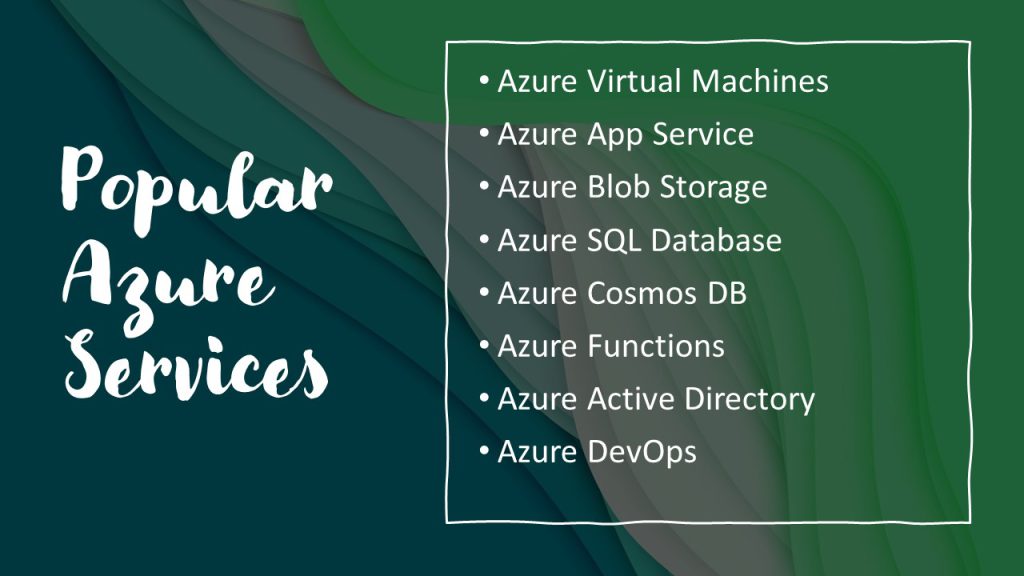Azure Fundamentals is a course designed for those who are new to the world of Azure cloud computing. The course provides an overview of the core Azure services, including computing, storage, and networking, as well as an introduction to Azure security and compliance. Students will learn how to create and manage Azure resources, how to use Azure tools and services to monitor and troubleshoot issues, and how to deploy and manage applications on Azure. By the end of the course, students will have a foundational understanding of Azure cloud computing and be able to apply this knowledge to build their own cloud solutions.
- Introduction to Microsoft Azure
- Azure infrastructure and global regions
- Azure service categories
- Few Popular Azure Services
Introduction to Microsoft Azure
Microsoft Azure is a cloud computing service created by Microsoft Corporation that provides a range of services, including computing, storage, networking, and application hosting. With Azure, users can develop, test, and deploy applications in the cloud using the tools and technologies they prefer. Azure offers a vast array of features that can help businesses of all sizes to manage and scale their IT infrastructure more efficiently and effectively.
Azure is built on a global network of Microsoft-managed data centers and is available in over 60 regions worldwide, making it one of the largest public cloud services available today. The platform offers many advantages, including flexibility, scalability, and security. Azure is designed to be highly available, with a service level agreement (SLA) of 99.95%, ensuring that your applications are always up and running.
In addition to traditional infrastructure as a service (IaaS) offerings such as virtual machines and storage, Azure offers a range of platform as a service (PaaS) and software as a service (SaaS) offerings such as Azure App Service, Azure SQL Database, and Office 365. These services allow developers to focus on building applications and not worry about the underlying infrastructure, making it an attractive choice for many businesses looking to move to the cloud. With Azure, businesses can reduce costs, increase agility, and speed up time-to-market for their products and services.
Azure infrastructure and global regions
Azure is a cloud computing platform offered by Microsoft that provides a wide range of services and solutions for building, managing, and deploying applications and services in the cloud. One of the key features of Azure is its infrastructure, which is designed to provide a highly available, scalable, and reliable cloud computing environment. Azure’s infrastructure is spread across more than 60 regions around the world, with each region consisting of multiple data centers that are interconnected by a high-speed network.
Each region in Azure is designed to be independent and isolated from other regions, which means that customers can choose to store their data and deploy their applications in specific regions to meet their compliance and data residency requirements. Additionally, each region is designed to be highly available, with redundant power, cooling, and networking infrastructure to ensure that applications and services remain online even in the event of hardware or network failures.
Azure’s global infrastructure also provides customers with the ability to deploy their applications and services closer to their end-users, which can help reduce latency and improve the overall user experience. Azure’s infrastructure is designed to provide low-latency connectivity between regions, which means that customers can deploy their applications and services globally while still maintaining a high level of performance and reliability.
Azure service categories
Microsoft Azure offers a wide range of cloud-based services and resources that can be categorized into various categories, including:
- Compute: This category includes services that allow users to provision and manage virtual machines, container instances, and serverless computing resources. Some examples of services in this category include Azure Virtual Machines, Azure Kubernetes Service, and Azure Functions.
- Storage: Azure provides scalable and durable storage services that can be used for various types of data, including blobs, files, disks, and queues. Some of the services in this category include Azure Blob Storage, Azure Files, Azure Data Lake Storage, and Azure Queue Storage.
- Networking: This category includes services that help users to connect and manage their virtual networks, VPNs, load balancers, and application gateways. Some of the services in this category include Azure Virtual Network, Azure Load Balancer, Azure VPN Gateway, and Azure Application Gateway.
- Databases: Azure provides a range of fully managed and scalable database services, including relational, NoSQL, and in-memory databases. Some of the services in this category include Azure SQL Database, Azure Cosmos DB, Azure Database for MySQL, and Azure Database for PostgreSQL.
- Analytics: This category includes services that help users to analyze and process large amounts of data, including real-time data streams, big data, and data warehouses. Some of the services in this category include Azure Stream Analytics, Azure HDInsight, and Azure Synapse Analytics.
- Security: This category includes services for securing Azure resources, data, and identities, such as Azure Active Directory, Azure Security Center, Azure Key Vault, and Azure Information Protection.
- AI and Machine Learning: This category includes services for building intelligent applications and models, such as Azure Machine Learning, Cognitive Services, and Bot Service.
- Internet of Things (IoT): This category includes services for building and managing IoT solutions, such as Azure IoT Hub, Azure IoT Central, and Azure Sphere.
- DevOps: This category includes services for managing the software development lifecycle, such as Azure DevOps, Azure Artifacts, and Azure Repos.
Few Popular Azure Services
Microsoft Azure is a cloud computing platform that provides a wide range of services for building, deploying, and managing applications and services through Microsoft-managed data centers. Azure provides various services for compute, storage, networking, databases, analytics, machine learning, artificial intelligence, Internet of Things (IoT), and more. With Azure, organizations can easily and quickly create and manage scalable, reliable, and secure applications and services that can be accessed from anywhere in the world.

- Azure Virtual Machines: Azure Virtual Machines is a fully customizable infrastructure-as-a-service (IaaS) solution that allows users to deploy and manage virtual machines in the cloud. It provides users with complete control over the virtual machines and the operating systems they run.
- Azure App Service: Azure App Service is a platform-as-a-service (PaaS) solution that enables developers to build, deploy, and manage web and mobile apps. It supports a variety of programming languages, frameworks, and tools.
- Azure Blob Storage: Azure Blob Storage is a fully managed cloud storage solution that allows users to store and retrieve unstructured data such as documents, images, and videos. It provides users with the ability to scale their storage needs up or down as required.
- Azure SQL Database: Azure SQL Database is a fully managed relational database service that allows users to create and manage relational databases in the cloud. It provides users with features such as automatic patching and backups, high availability, and scaling capabilities.
- Azure Cosmos DB: Azure Cosmos DB is a globally distributed, multi-model database service that allows users to store and manage data at planet-scale. It supports a variety of data models, including document, graph, key-value, and column-family, and provides users with low latency and high availability.
- Azure Functions: A serverless computing service that enables developers to run code on-demand, without having to manage the underlying infrastructure. It supports a variety of programming languages and can be used for a range of scenarios, from event-driven processing to web APIs and more.
- Azure Active Directory: A cloud-based identity and access management service that provides secure authentication and authorization for users, applications, and devices. It integrates with many Microsoft and third-party applications and can be used to manage user identities, control access to resources, and enforce security policies.
- Azure DevOps: A suite of cloud-based tools for software development and delivery, including source control, build and release automation, testing, and project management. It supports a variety of programming languages and platforms, and enables teams to collaborate and streamline their software development processes.
- Azure Machine Learning: A cloud-based machine learning service that enables developers and data scientists to build, train, and deploy machine learning models. It provides a wide range of tools and frameworks for data preparation, feature engineering, model selection and tuning, and deployment.
- Azure Cognitive Services: A collection of pre-built AI models and APIs that developers can use to add intelligent features to their applications. These include vision, speech, language, and decision-making capabilities, such as image and text recognition, speech-to-text conversion, and chatbot creation.
- Azure IoT Hub: A fully-managed service for connecting, monitoring, and managing IoT devices at scale. It provides bi-directional communication between devices and the cloud, as well as secure device management, device-to-cloud and cloud-to-device messaging, and device provisioning and configuration.
- Azure Kubernetes Service: A fully-managed Kubernetes container orchestration service that simplifies the deployment, scaling, and management of containerized applications. It supports both Linux and Windows containers, and integrates with other Azure services, such as Azure Container Registry, Azure Monitor, and Azure DevOps.
- Azure Security Center: A unified security management and monitoring service that provides advanced threat protection across hybrid cloud workloads. It offers security recommendations, threat protection, and vulnerability management, as well as integration with other security solutions, such as Azure Sentinel and Azure Firewall.
References
- Microsoft Learn: Azure Fundamentals
- Azure Documentation
- Azure YouTube Channel
- Pluralsight: Azure Fundamentals learning path
- Udemy: Microsoft Azure Fundamentals (AZ-900)
- LinkedIn Learning: Learning Microsoft Azure Fundamentals
- A Cloud Guru: Azure Fundamentals
